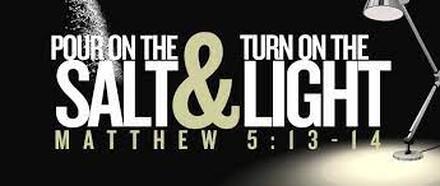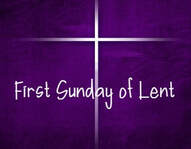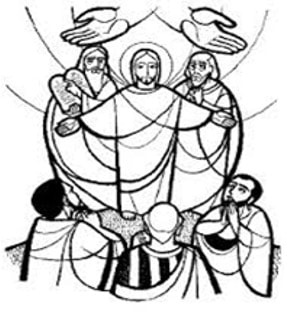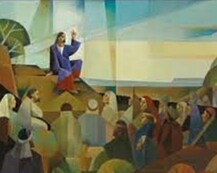|
Reflection: “Lent – tell me more”
provided by Peter Andrews this week. So what is today all about – the first Sunday of lent? The origin of the word lent can be traced back to old English - lencten, or lengten - spring season. Literally it means lengthening of hours of daylight which of course refers to the lengthening of days in the northern hemisphere. So the word embraces a sense of moving out of darkness towards the light Of course that makes less sense to us here in the southern hemisphere – an undeniable fact that led to one brave member of the assembly’s transforming worship group to hypothesise “could we shift the church calendar to suit us? Everything - lent, Easter, Christmas - the whole shebang moved six months so it works for us. It might actually help to make people aware of both the origins of these festivals of faith and decouple them from the secularisation/commercialisation of things like Easter and Christmas so they regain some spiritual meaning". I’m not brave enough to go down that path (although I am sympathetic to the reasoning) so lets approach the subject from a more conventional perspective. Lent is a season of preparation and discipline that begins on Ash Wednesday and concludes at sundown on Holy Saturday - a period of forty weekdays and six Sundays - a period of grief that ends with the great celebration of Easter. Interestingly in eastern orthodox circles the season is known as "bright sadness" Lent is a time when the church especially remembers the life and ministry of Jesus and renews its commitment to him in Christian discipleship. Some Lent-observing Christians incorporate a Lenten spiritual discipline, such as reading a daily devotional or praying through a Lenten calendar. Other Christians commit to fasting, as well as giving up certain luxuries in imitation of Jesus’s sacrifice during his journey into the desert for 40 days. Our catholic friends often observe the stations of the cross, a devotional commemoration of Christ’s carrying the cross and crucifixion. This practice has been incorporated into other forms of reflection and celebration such as the stations of the cross art exhibition that has been staged by St Ives and then Northmead congregations with art pieces offered by a wide range of religious and secular artists -thus providing the opportunity and fresh stimulus for reflection. Some churches remove flowers from their altars and veil crucifixes, religious statues that show the triumphant Christ, and other elaborate religious symbols in violet fabrics in solemn observance until Good Friday. In most Lent-observing denominations, - following the New Testament narrative - the last week of lent coincides with Holy Week, starting with Palm Sunday. Beyond the factual narrative, what of the personal aspects? Lent provides a special or focused opportunity for self-reflection, simplicity, and sincerity (honesty) to pay attention to ourselves and our surroundings, to leave some things behind and become more open to the spirit of God. Over time three entwined practices have come to be associated with the period of Lent.
The question that hangs in the air is how we might experience and celebrate Lent in 2023 – both as a church community and also as individuals. I invite you to take a moment to reflect on your own Lenten journey. Peter
1 Comment
Reflection: Transfiguration; the Christian Hannukah
- Matthew 17:1-8 provided this week by Andrew Corish Today we are considering the Transfiguration story. It is an important story. It appears in all 3 synoptic gospels in much the same form and place. The story is that Jesus took his executive group of Peter, James and John, up a high mountain. There he is “transfigured”, and his face shone like the sun and his clothes became dazzling white. Then the two great “pillars” of the Jewish scripture; Moses the lawgiver and Elijah the leader of the prophets, appear in person and speak to Jesus. Peter then pipes up and offers to build three “dwellings”, one for each of them, in tribute. These dwellings were the “booths” or ”sukkot”; being simple lean-to structures, which the Jews built during their Harvest festival called Sukkoth, to remind them of the time they worshipped God in temporary shelters in the desert during the Exodus. It seems to be a suggestion by Peter, that by offering to build the three sukkot, Jesus was one and equal with Moses and Elijah. But God speaks from the cloud as he did to Moses and to Jesus at his baptism and uses the same words from the baptism, namely, ”this is my son, the Beloved, with whom I am well pleased. Listen to him.” This seems an endorsement by God that here with Jesus, you have something even greater than Moses and Elijah. So what to make of the Transfiguration story? The first thing is that it seems a retelling of the Moses’ story in Exodus 34 when Moses comes down from Mt Sinai with the 10 Commandments and his face and clothes shone, because he had been talking with God, so much so, he had to wear a veil. It also brings to mind the important little book of the prophet Zechariah who was clothed in rags but is clothed by God in splendour. Secondly, progressive theologians have suggested it is intricately linked to the Jewish Dedication or “Hannukah” festival. In 175BC the Syrian ruler of Israel, Antiochus Epiphanes was trying to stamp out Judaism. In a final act, he desecrated the Temple in Jerusalem by having a pig’s head put on the judgement seat in the Holy of Holies room at the centre of the Temple. That was too much for the Jews to bear and they rose in rebellion, led by Judas Maccabeus, (Maccabeus being the Hebrew word for “hammer) He led a successful guerrilla campaign and eventually drove out the Syrians in 164AD. The Temple was restored and an 8-day festival of Dedication instituted in the middle of December each year, when the Jews celebrated the “light of God”, the “shekinah” returning to the Temple. This festival was called Hanukkah and was very popular thereafter and has been celebrated to this day. Then go forward to 66AD. This was when another Jewish revolt began. This time led by the Zealots in Galilee to overthrow the Romans as the Maccabees had done before them. However, the guerrilla campaign this time proved a terrible failure. Rome responded viciously, initially crushing the Galilean rebellion and then turning the armies on Jerusalem. They destroyed the city and the Temple and obliterated the country of Israel from the map in 70AD. Interestingly Mark wrote his Gospel, probably in Caesarea Philippi in Northern Galilee in about 70AD. It was a time of terrible tension. Judaism hung by a thread. It is suggested by Progressive Theologians that Mark structured his gospel to provide Jesus stories and materials, to coincide and be read in the Synagogues, according to the Jewish liturgical calendar. That is, he provided Jesus stories for each of the major Jewish festivals. Their festivals were Passover at Easter, Shavuot or Pentecost in May, Rosh Hashanah, Yom Kippur the day of atonement, Sukkoth, the Harvest Festival in October and Hannukah in December. His gospel wasn’t meant to be a biography or memoire of Jesus at all. It was Jewish stories and festivals reinterpreted to incorporate Jesus stories into them. So in Mark 9 it is suggested that Mark wrote the Transfiguration story to be read in winter and coincide with Hannukah celebration in the synagogue. In it, Mark provided a wonderful vision to the remaining people of Israel. God has not abandoned his people. Rather he has given them a new vision and vocation. The Temple was gone with its animal sacrifices. Instead, Jesus had become the new sacrifice, once and for all. The “shekinah”, the light of God now shone on Jesus, as it had formerly shone on Moses. The Jews had a new purpose and vocation. That in their suffering and humiliation, through this new great prophet Jesus who had arisen, they could now bring the love of God to the whole world. But things did not go well from there. In the period of 12 to15 years prior to Matthew producing the second gospel, relationships deteriorated between the Jews and Christians. In his gospel, Matthew incorporated 90 per cent of Mark, including the Transfiguration story. He adopted the same structure and purpose as Mark. Except Mark had written material for the synagogue from the Rosh Hashanah Harvest festival in October to Passover in Easter. Matthew front loaded his gospel to provide additional material for the period from Easter to October, including the Sermon on the mount where Jesus reinterpreted the 10 Commandments, to coincide with the Shavuot -Pentecost ceremony which celebrate Moses providing the 10 Commandments. Unfortunately, the Jewish leaders did not accept the generous offer of Mark to provide a way forward for Judaism following the destruction of Israel and the Temple. It was a difficult time for them. The fundamentalists increasingly took control and began excluding “people of the Way”, the Jesus movement, from the synagogues. In response, the concept of the “Betrayal”, Jesus betrayed by one of his own and the Jewish people , increasingly took control. But did Judas do that? That was part of the deterioration of relations. Judas is another translation of Judah or the Jewish people. Paul knew nothing about Judas or didn’t say so. All he said was “on the night he was betrayed” which could also be translated as “handed over”. So Christians were excluded and excommunicated from the Synagogue in 88AD which caused terrible pain and suffering. In return, Jews were excluded from the church and reviled and blamed. We lost the wonderful Jewish insight, wisdom and spiritualism from the church. Greek and Roman literalism and fundamentalism and antisemitism took control. The church has never recovered. So many of the problems of the worldwide church stem from this fundamentalism and literalism and we have suffered from the lack of Jewish wisdom and insight. Is it too late to get back together? So, you may not like this and are quite entitled to reject it as rubbish. But hopefully in the Uniting Church we are open to consider different ideas. I have to say, I was really struck when I did my last sermon on Romans. This was Paul’s gospel. He was writing in the 50s. He said he had checked it out with the church leaders in Jerusalem and his ideas had been endorsed. His gospel was nothing like the story of Jesus in the 4 official gospels. And so with Mark, writing at this time of terrible crisis in Israel. Mark provides Jesus stories to be read in the synagogues as Jesus’ responses to the great Jewish festivals. To show Jesus is the way forward, the new great prophet and Messiah. His pattern is copied by Matthew and Luke. It does seem it is not so much that Jesus’ ministry took place over a period of 12 months. That was the length of the Jewish Liturgical year. Then John’s gospel was the writings of a Jewish mystic but also was never intended to be taken as literally true. So what do I get from this passage of the Transfiguration. I think perhaps I feel we should pay more attention and respect to the Jewish writings in the Old Testament and their festivals. I think it helps to try to read the gospels with Jewish eyes in the first century, to the extent we can manage that. I think we need to accept that the Gospel is always changing and we need to be ready and willing to change with it. Bishop Spong wrote great books titled “Biblical Literalism, a Gentile Heresy” and “Liberating the Gospels, reading the gospels with Jewish eyes” and suggested that most of the Gospels are wonderful, symbolic, full of truth and wisdom, but perhaps not literally true. I love the message in the Transfiguration. That the light of God that used to shine in the Temple, is now shining in Jesus. It can shine in us as well, in our hearts. That is the real test of being a Christian. That in everything we believe and say and do, that the light of God shines in us, for all to see. Amen. Andrew Corish Reflection: “Faith is a way of living” This week Rick is on holidays and I have been asked to write the reflection. I am going to look at the Gospel reading from the Lectionary Matthew 5:21-37.
At times we all get annoyed at other people around us, it could be a husband or wife or even a total stranger who somehow seems to have done the wrong thing. If things get really bad it can become an all-consuming hate. Hate erodes us and our pride can at times get the better of us. But Jesus has given us a set of instructions to put things right in our lives. The Gospel reading at first glance seems very harsh and stern, not the sort of thing we usually expect in Jesus’ teachings, it even gets a bit gory if you read it literally. Obviously it was not addressed to a modern-day audience although its message is still as relevant today as it was two thousand years ago. It was an address to Jews in a traditional Middle Eastern style using hyperbole, and culturally appropriate images. In the first part of the reading Jesus talks about being ready to accept God, to forgive others and set our life right. It is similar to the line in the Lord’s Prayer that we will be forgiven by God as we forgive those who sin against us. This is not some sort of deal we are striking with God. This is teaching to help us accept the grace of God and find a deep joy in faith. Jesus gave us two basic commandments, love your God with all your might, and love your neighbour as yourself. This reading from Matthew shows us that these two are linked, that to love God you need to live your faith and respect those around you. Jesus tells us that to be right within ourselves and with God, we need to be right with others. The second part of the reading tells of the seriousness of sin and highlights this with the gouging of eyes and cutting off, of hands. All gruesome stuff and seems at first glance to conflict with the idea of forgiveness of sin. This is a literary device often used in ancient literature, which exaggerates the idea to emphasize its importance. I doubt if anyone in their right mind would actually do such things, and I wonder how, if taken literally does it fit with the Gospel message of a loving and compassionate God? Jesus then goes on to instruct the Jews to observe Jewish Law and talks of divorce which seems to be at odds with modern thinking, but this was at a time of Roman rule when Jewish law was threatened. I assume that Jesus was encouraging them to lead upstanding moral lives, which might have been very difficult with the prevailing morals of the Roman Empire. Some may ask “Why would you even bother; this only makes life more difficult”. Many think if you can get away with it and not get caught, then why not? Well we could easily think of a judgmental God who has the power to condemn but this view of the judgmental God and the ensuing guilt trip really belongs to the medieval age and not the Gospel message. Jesus tells us God will forgive our sins but that we must have faith, we must live our lives before God and follow his word. There is no room for a double life, we can’t wilfully sin and then say “Oh, that’s OK, my sins are forgiven”. Yes in some ways it can make life a little more difficult but the rewards are great, no I am not talking of Heaven and Hell, but the richness and joy that faith can give. Although all major religions aim for a rich spiritual life and moral behaviour, the power of Christianity is the Gospel message of a deep and meaningful relationship with God through our faith in Christ. Peace be with you…Warwick Reflection: "Salt and Light" Salt and light are pretty ordinary things to us today, but you might look on them differently if you lived a few thousand years ago in Israel.
No refrigeration meant that their meat had to be salted to keep it for more than a day or two. And once the sun went down, you only had dull candles and oil lamps by which to see. Jesus says to his followers: “You are the salt of the earth! You are the light of the world!” I’m sure he wasn’t talking about white granular crystals falling out of the disciples’ clothes as they walked around, or physical light, like a torch, beaming from their faces, but it was more about their presence flavouring the environment in which they lived and a personal light; the light of faith, hope and love. The very light of God within us and radiating from us. But wait a minute, did he say that we are the salt and light of the world? That’s a pretty big call to make, because surely we can’t be that important, can we? As we read in Paul’s words to the Corinthian church, gifts such as these come from God, not man, and are bestowed on us through the spirit. “Let your light so shine before others, that they may see your good deeds, and give glory to God in heaven.” Well, does the light shine through us? Do we add flavour to the lives of others and do our lives give glory to God? I’m not trying to verbally box anyone about the ears with accusations about their failure to be the light of the world. I’m not trying to kick start anyone into freely doing more Christian things. (that is: “Christ-ian”, of the family of Christ, or Christ-like). I’m pretty sure that you, like me, have plenty of room for improvement. But I’m not seeking to take any of us on a guilt trip. There’s a much healthier and more faithful direction for us to go when reading this message. What Jesus actually said to his followers was: “You are the salt of the earth and the light of the world.” You are - you are now. Not - you could be or should be. Not - tidy up your act, stiffen your backbones and commence trying. Not - maybe in ten years’ time, or if you work very hard, perhaps by the end of the year. What our Lord said was more immediate, more of a gob-smacking surprise. “By trusting the unexpected, un-earnable, grace of God, as it flows to you through my words and deeds, you are, right now – the salt and light of the world.” Though it’s not really our salt and light, but his, and it’s not by any of our strenuous efforts, but by the pure grace of God. Jesus must have been like pepper up the noses of the religious authorities in ancient Israel. They taught: If you keep all the laws and regulations of the Old Testament and observe the additional 613 by-laws that our rabbis have added - for your own good, of course. If you ritually wash and purify yourself each day, if you make the requisite sacrifices at the temple, and avoid any contact or fellowship with the despicable non-Jews, then.... just maybe, you may begin to be a little light in the darkness of the world. Not so with Jesus, whose only requirement was for us to accept the free gift of love that God offers. Simply to come as we are and just open your windows to the light, allowing it to touch even the dusty corners of our hearts and souls. Then, without any question, we will show that we are the light of the world. The salt and light of God are gifts to be lovingly accepted and cherished - then freely shared with others. We might doubt that we’re capable of achieving this, but I can attest that we ARE all able to do whatever God asks of us. Friends, take courage. This is not a silly claim of mine that I’m repeating here. It’s the claim of Jesus, of whom it was said: “He knew what was in the heart of men.” As long as our lives remain open to his Spirit, we shall be, in spite of our confounded defects, the salt and light of the world. The tiny bits of faith, hope and love that the grace of God has sown in our mind and heart, qualify us to be the bearers of the word of Christ Jesus – the Gospel. For God’s sake, and for the sake of those around you, have more faith in the gift. Don’t fall into the temptation of despising yourself and giving up. After all, it’s God’s salt and God’s light, not your failings, that count. Never yield to despair. Christ is always greater than your darkness. Christians like Peter, John, and Paul, Mary and Martha; and many other notable disciples, all had their failures on a grand scale, yet they were indeed beacons in a dark world. There’s only one thing that can prevent the light of Christ from shining through us and that’s if we choose to hide it. To be a secret Christian is not a valid option - we need to share it or lose it. God won’t withdraw the light, but because he gave us free will, we can choose to cover it up. Should we choose to do this, maybe like putting a bucket over a candle, then the light, starved of oxygen, will decline to a flicker, then degenerate to acrid smoke, smoulder a while and then grow cold. We have to choose - do we want to put out God’s light? The grace of God comes to us, undiluted and free. But, like that forsaken man hanging on the cross, grace is not impervious to human rejection. So would you rather be a strong, salty taste, or an insipid tasteless being? A bright light, shining for God, or a tiny candle, tucked safely under a bucket, who’s about to be snuffed out when the oxygen runs out. Keep your saltiness pure and beam your light into the world. Get out there and tell others about the gospel of Jesus and then you truly will be the salt and light of God. Vaya con Dios………….Pastor Rick |
Pastor
|
LANE COVE
|
Worship Service:9:30am Sunday
© Lane Cove Uniting Church | 2020
|





 RSS Feed
RSS Feed